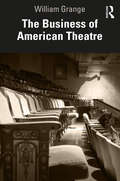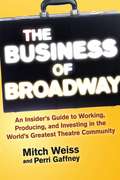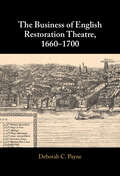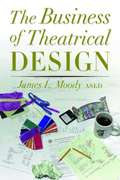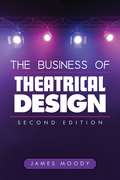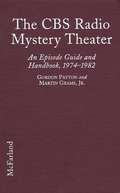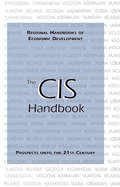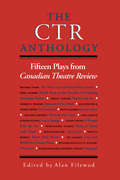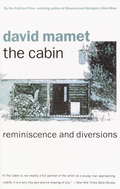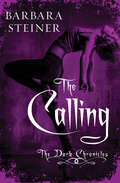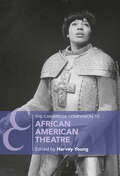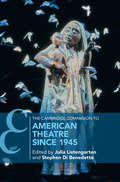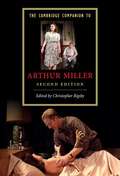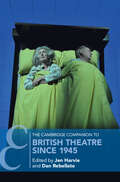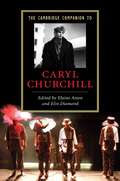- Table View
- List View
The Business of American Theatre
by William GrangeThe Business of American Theatre is a research guide to the history of producing theatre in the United States. Covering a wide range of subjects, the book explores how traditions of investment, marketing, labor union contracts, advertising, leasing arrangements, ticket scalping, zoning ordinances, royalties, and numerous other financial transactions have influenced the art of theatre for the past three centuries. Yet the book is not a dry reiteration of hits and flops, bankruptcies and bamboozles. Nor does it cover "everything about it that's appealing, everything the traffic will allow" (as Irving Berlin did in the song "There's No Business Like Show Business"). It is instead a highly readable resource for anyone interested in how money, and how much money, is critical to the art and artists of theatre. Many of those artists make appearances in the book: Richard Rodgers and his keen eye for investment, Jacob Shubert and his construction of "the bridge of thighs" for his showgirls at the Winter Garden, the significance of the Disney Souvenir Shop near the Lyceum Theatre on Broadway, and the difference between a Broadway show losing millions of dollars or making billions in one night. Consider this book a go-to resource for readers, students, and scholars of the theatre business.
The Business of Broadway: An Insider?s Guide to Working, Producing, and Investing in the World?s Greatest Theatre Community
by Mitch Weiss Perri GaffneyNew York’s Broadway theatre scene has long been viewed as the "top of the heap” in the world theatre community. Taking lessons from the very best, this innovative guide delves into the business side of the renowned industry to explain just how its system functions. For anyone interested in pursuing a career on Broadway, or who wants to grow a theatre in any other part of the world, The Business of Broadway offers an in-depth analysis of the infrastructure at the core of successful theatre. Manager/producer Mitch Weiss and actor/writer Perri Gaffney take readers behind the scenes to reveal what the audience--and even the players and many producers--don’t know about how Broadway works, describing more than 200 jobs that become available for every show. A variety of performers, producers, managers, and others involved with the Broadway network share valuable personal experience in interviews discussing what made a show a hit or a miss, and how some of the rules, regulations, and practices that are in place today were pioneered.
The Business of English Restoration Theatre, 1660–1700
by Deborah C. PayneDeborah C. Payne's ground-breaking study traces the historical origins of a dilemma still bedevilling theatre companies: how to reconcile audience demand for novelty with profitability. As a solution, English acting companies in 1660 adopted an unprecedented theatrical duopoly. Implicit to its economic logic were scarcity, prestige, and innovation: attributes that, it was hoped, would generate wealth and exclusivity. Changes to playhouse architecture, stagecraft, dramatic repertory, and company practices were undertaken to create this new, upmarket theatre of “great expences.” So powerful was the promise of the duopoly and so enthralling the wholesale transformation of the theatrical marketplace that management—despite dwindling box office—resisted change for 35 years. Drawing upon network and behavioural economic theory, Professor Payne shows why the acting companies clung to an economic model inimical to their self-interest. Original archival research further bolsters this radically new perspective on an exciting and crucial period in English theatre. This title is also available as Open Access on Cambridge Core.
The Business of Theatrical Design
by James MoodyFor theatrical design students and theater professionals, here is the essential guide to marketing your skills, furthering your career, and operating a successful business! In The Business of Theatrical Design, design veteran James Moody shares his proven techniques to help costume, scenic, and lighting designers become successful businesspeople. Here is the latest information regarding IRS, state, and business liabilities; salary and fee scales; equipment costs; professional organizations; union and contract issues; and much more. Plus dozens of working producers, promoters, and designers share their insights and offer a thorough, true-to-life profile of this competitive industry. An indispensable resource for anyone looking to pursue a career in the theater!
The Business of Theatrical Design, Second Edition
by James MoodyWritten by a leading design consultant and carefully updated with the latest information on the industry, this is the essential guide to earning a living, marketing skills, furthering a design career, and operating a business. With more than thirty years of backstage and behind-the-scenes experience in theater, film, television, concerts, and special events, James Moody shares his success secrets for the benefit of design students and working designers. Topics include: Finding and landing dream assignmentsNegotiating feesSetting up ideal working spacesBuilding the perfect staffOvercoming fears of accounting and record-keepingChoosing the right insuranceJoining the right unions and professional organizationsAnd more In addition to revealing how to get the great design jobs in traditional entertainment venues, the author shows designers how to think outside the box and seize creative, lucrative opportunities—such as those in theme parks, in concert halls, and with architectural firms. Providing the keys for passionate, talented designers to become successful businesspeople, The Business of Theatrical Design is a must-read for novices and established professionals alike.
The CBS Radio Mystery Theater: An Episode Guide and Handbook to Nine Years of Broadcasting, 1974-1982
by Gordon Payton Martin GramsAlmost every evening for nine years during the late 1970s and early 1980s, the CBS Radio Mystery Theatre brought monsters, murderers and mayhem together for an hour. Created, produced and directed by Himan Brown, the series remains a landmark in radio drama. This book is a detailed history and episode guide to the show. Descriptive information includes exact titles, airdates and rebroadcast dates, episode numbers, cast lists, writer and adapter credits, and a storyline synopsis. This material comes directly from CBS press releases in order to insure complete accuracy. Also included wherever possible are information about the actors and actresses, quotes from performers and writers (many from personal interviews), anecdotes about various scripts and sound effects, and other notes of interest.
The CIS Handbook (Regional Handbooks of Economic Development #Vol. 4)
by Patrick Heenan Monique Lamontagne Ronald J. Hill Bogdan SzajkowskiFirst Published in 2000. Routledge is an imprint of Taylor & Francis, an informa company.
The CTR Anthology
by Alan FilewodSince its inception in 1974, "Canadian Theatre Review" has been one of the most important publishers of new Canadian plays. With a script in each issue, CTR has introduced new writers and advocated new approaches to Canadian drama. This volume brings together fifteen of the most significant plays published in CTR between 1974 and 1991. Most have been out of print since their appearance in the journal. They include recognized classics that have transformed Canadian theatre, such as "Ten Lost Years" and "This is for You, Anna," and lesser-known plays by such major writers as Robert Lepage and George F. Walker. Taken together these plays not only expand the boundaries of Canadian drama; they also document an important and exciting period in Canadian theatre. They are vivid testaments to the diversity of contemporary theatrical practice in Canada.
The Cabin
by David MametIn these mordant, elegant, and often disquieting essays, the internationally acclaimed dramatist creates a sort of autobiography by strobe light, one that is both mysterious and starkly revealing.The pieces in The Cabin are about places and things: the suburbs of Chicago, where as a boy David Mamet helplessly watched his stepfather terrorize his sister; New York City, where as a young man he had to eat his way through a mountain of fried matzoh to earn a night of sexual bliss. They are about guns, campaign buttons, and a cabin in the Vermont woods that stinks of wood smoke and kerosene -- and about their associations of pleasure, menace, and regret.The resulting volume may be compared to the plays that have made Mamet famous: it is finely crafted and deftly timed, and its precise language carries an enormous weight of feeling.From the Trade Paperback edition.
The Calling (The Dark Chronicles #3)
by Barbara SteinerMiki O'Ryan jumps at the chance to be part of a mysterious dance troupe--until she realizes its members may be more dangerous than they appear For several nights, Miki O'Ryan has snuck into the condemned Sullivan Theater to watch an enigmatic, shadowy group perform haunting routines that are part gymnastics, part dance, and part magic. When the director catches Miki spying one night, he invites her to join them. The Theater of the Dead is a gothic troupe whose members all pretend to be vampires. Miki is thrilled to finally belong to a family, however odd it may be. When the gorgeous Davin is assigned to be her partner--and seems as if he may be interested in being more--Miki is ready to follow the Theater of the Dead anywhere. But whenever Miki dances with them, she feels as if they are putting her under a spell with their sensuous movement and hypnotic eyes. Is it possible that these strange people are more than what they seem? Miki realizes she may be in danger of losing her life--and her soul--to the Theater of the Dead.
The Cambridge Companion To British Theatre, 1730-1830
by Jane Moody Daniel O'QuinnThis Companion offers a wide-ranging and innovative guide to one of the most exciting and important periods in British theatrical history. The scope of the volume extends from the age of Garrick to the Romantic transformation of acting inaugurated by Edmund Kean. It brings together cutting-edge scholarship from leading international scholars in the long eighteenth century, offering lively and original insights into the world of the stage, its most influential playwrights and the professional lives of celebrated performers such as James Quin, George Anne Bellamy, John Philip Kemble, Dora Jordan, Fanny Abington and Sarah Siddons. The volume includes essential chapters about eighteenth-century acting, production and audiences, important surveys of key theatrical forms such as tragedy, comedy, melodrama and pantomime as well as a range of exciting thematic essays on subjects such as private theatricals, 'black' theatre and the representation of empire.
The Cambridge Companion to African American Theatre
by Harvey YoungThis Companion provides a comprehensive overview of African American theatre, from the early nineteenth century to the present day. Along the way, it chronicles the evolution of African American theatre and its engagement with the wider community, including discussions of slave rebellions on the national stage, African Americans on Broadway, the Harlem Renaissance, African American women dramatists, and the 'New Negro' and 'Black Arts' movements. Leading scholars spotlight the producers, directors, playwrights and actors whose efforts helped to fashion a more accurate appearance of black life on stage, and reveal the impact of African American theatre both within the United States and further afield. Chapters also address recent theatre productions in the context of political and cultural change and ask where African American theatre is heading in the twenty-first century.
The Cambridge Companion to African American Theatre (Cambridge Companions to Theatre and Performance)
by Harvey YoungThis new edition provides an expanded, comprehensive history of African American theatre, from the early nineteenth century to the present day. Including discussions of slave rebellions on the national stage, African Americans on Broadway, the Harlem Renaissance, African American women dramatists, and the New Negro and Black Arts movements, the Companion also features fresh chapters on significant contemporary developments, such as the influence of the Black Lives Matter movement, the mainstream successes of Black Queer Drama and the evolution of African American Dance Theatre. Leading scholars spotlight the producers, directors, playwrights, and actors who have fashioned a more accurate appearance of Black life on stage, revealing the impact of African American theatre both within the United States and around the world. Addressing recent theatre productions in the context of political and cultural change, it invites readers to reflect on where African American theatre is heading in the twenty-first century.
The Cambridge Companion to American Theatre since 1945 (Cambridge Companions to Theatre and Performance)
by Stephen Di Benedetto Julia ListengartenThe Cambridge Companion to American Theatre since 1945 provides an overview and analysis of developments in the organization and practices of American theatre. It examines key demographic and geographical shifts American theatre after 1945 experienced in spectatorship, and addresses the economic, social, and political challenges theatre artists have faced across cultural climates and geographical locations. Specifically, it explores artistic communities, collaborative practices, and theatre methodologies across mainstream, regional, and experimental theatre practices, forms, and expressions. As American theatre has embraced diversity in practice and representation, the volume examines the various creative voices, communities, and perspectives that prior to the 1940s was mostly excluded from the theatrical landscape. This diversity has led to changing dramaturgical and theatrical languages that take us in to the twenty-first century. These shifting perspectives and evolving forms of theatrical expressions paved the ground for contemporary American theatrical innovation.
The Cambridge Companion to Arthur Miller
by Christopher BigsbyArthur Miller is regarded as one of the most important playwrights of the twentieth century, and his work continues to be widely performed and studied around the world. This updated Companion includes Miller's work since the publication of the first edition in 1997 - the plays Mr Peters' Connections, Resurrection Blues, and Finishing the Picture, recent film adaptations, and key productions of his plays since his death in 2005. Book jacket.
The Cambridge Companion to August Wilson
by Christopher BigsbyOne of America's most powerful and original dramatists, August Wilson offered an alternative history of the twentieth century, as seen from the perspective of black Americans. He celebrated the lives of those seemingly pushed to the margins of national life, but who were simultaneously protagonists of their own drama and evidence of a vital and compelling community. Decade by decade, he told the story of a people with a distinctive history who forged their own future, aware of their roots in another time and place, but doing something more than just survive. Wilson deliberately addressed black America, but in doing so discovered an international audience. Alongside chapters addressing Wilson's life and career, and the wider context of his plays, this Companion dedicates individual chapters to each play in his ten-play cycle, which are ordered chronologically, demonstrating Wilson's notion of an unfolding history of the twentieth century.
The Cambridge Companion to Brecht
by Peter Thomson Glendyr SacksThis Companion offers students crucial guidance on virtually every aspect of the work of this complex and controversial writer, bringing together the contrasting views of major critics and active practitioners. The opening essays place Brecht's creative work in its historical and biographical context and are followed by chapters on single texts, from The Threepenny Opera to The Caucasian Chalk Circle, on some early plays, on the Lehrstücke and on the neglected contribution of Elisabeth Hauptmann to the Brecht canon. The third group of essays analyse Brecht's directing, his theatrical theories, his poetry, his interest in music, his significant collaboration with stage designers and his work with actors, concluding with an assessment of Brecht's continuing influence on theatre practice. A detailed calendar of Brecht's life and work and a selective bibliography of English criticism complete this provocative overview of a writer who constantly aimed to provoke.
The Cambridge Companion to Brian Friel
by Anthony RocheBrian Friel is widely recognized as Ireland's greatest living playwright, winning an international reputation through such acclaimed works as Translations (1980) and Dancing at Lughnasa (1990). This 2006 collection of specially commissioned essays includes contributions from leading commentators on Friel's work (including two fellow playwrights) and explores the entire range of his career from his 1964 breakthrough with Philadelphia, Here I Come! to his most recent success in Dublin and London with The Home Place (2005). The essays approach Friel's plays both as literary texts and as performed drama, and provide the perfect introduction for students of both English and Theatre Studies, as well as theatregoers. The collection considers Friel's lesser-known works alongside his more celebrated plays and provides a comprehensive critical survey of his career. This is a comprehensive study of Friel's work, and includes a chronology and further reading suggestions.
The Cambridge Companion to British Theatre since 1945 (Cambridge Companions to Theatre and Performance)
by Jen Harvie Dan RebellatoBritish theatre underwent a vast transformation and expansion in the decades after World War II. This Companion explores the historical, political, and social contexts and conditions that not only allowed it to expand but, crucially, shaped it. Resisting a critical tendency to focus on plays alone, the collection expands understanding of British theatre by illuminating contexts such as funding, unionisation, devolution, immigration, and changes to legislation. Divided into four parts, it guides readers through changing attitudes to theatre-making (acting, directing, writing), theatre sectors (West End, subsidised, Fringe), theatre communities (audiences, Black theatre, queer theatre), and theatre's relationship to the state (government, infrastructure, nationhood). Supplemented by a valuable Chronology and Guide to Further Reading, it presents up-to-date approaches informed by critical race theory, queer studies, audience studies, and archival research to demonstrate important new ways of conceptualising post-war British theatre's history, practices and potential futures.
The Cambridge Companion to Caryl Churchill
by Elaine Aston Elin DiamondCaryl Churchill's plays are internationally performed, studied and acclaimed by practitioners, theatre scholars, critics and audiences alike. With fierce imagination the plays dramatise the anxieties and terrors of contemporary life. This Companion presents new scholarship on Churchill's extraordinary and ground-breaking work. Chapters explore a cluster of major plays in relation to pressing social topics - ecological crisis, sexual politics, revolution, terror and selfhood - providing close readings of texts in their theatrical, theoretical and historical contexts. These topic-based essays are intercalated with other essays that delve into Churchill's major collaborations, her performance innovations and her influences on a new generation of playwrights. Contributors explore Churchill's career-long experimentation - her risk-taking that has reinvigorated the stage, both formally and politically. Providing a new critical platform for the study of a theatrical career that spans almost fifty years, the Companion pays fresh attention to Churchill's poetic precision, dark wit and inexhaustible creativity.
The Cambridge Companion to Chekhov
by Vera Gottlieb Paul AllainThis volume of specially commissioned essays explores the world of Anton Chekhov - one of the most important dramatists in the repertoire - and the creation, performance and interpretation of his works. The Companion begins with an examination of Chekhov's life, his Russia, and the original productions of his plays at the Moscow Art Theatre. Later film versions and adaptations of Chekhov's works are analysed, with valuable insights also offered on acting Chekhov, by Ian McKellen, and directing Chekhov, by Trevor Nunn and Leonid Heifetz. The volume also provides essays on â special topics' such as Chekhov as writer, Chekhov and women, and the Chekhov comedies and stories. Key plays, such as The Cherry Orchard and The Seagull, receive dedicated chapters while lesser-known works and genres are also brought to light. The volume concludes with appendices of primary sources, lists of works, and a select bibliography.
The Cambridge Companion to Christopher Marlowe
by Patrick CheneyThe Cambridge Companion to Christopher Marlowe, first published in 2004, provides a full introduction to one of the great pioneers of both the Elizabethan stage and modern English poetry. It recalls that Marlowe was an inventor of the English history play (Edward II) and of Ovidian narrative verse (Hero and Leander), as well as being author of such masterpieces of tragedy and lyric as Doctor Faustus and 'The Passionate Shepherd to His Love'. Sixteen leading scholars provide accessible and authoritative chapters on Marlowe's life, texts, style, politics, religion, and classicism. The volume also considers his literary and patronage relationships and his representations of sexuality and gender and of geography and identity; his presence in modern film and theatre; and finally his influence on subsequent writers. The Companion includes a chronology of Marlowe's life, a note on reference works, and a reading list for each chapter.
The Cambridge Companion to David Hare
by Richard BoonDavid Hare is one of the most important playwrights to have emerged in the UK in the last forty years. This volume examines his stage plays, television plays and cinematic films, and is the first book of its kind to offer such comprehensive and up-to-date critical treatment. Contributions from leading academics in the study of modern British theatre sit alongside those from practitioners who have worked closely with Hare throughout his career, including former Director of the National Theatre Sir Richard Eyre. Uniquely, the volume also includes a chapter on Hare's work as journalist and public speaker; a personal memoir by Tony Bicât, co-founder with Hare of the enormously influential Portable Theatre; and an interview with Hare himself in which he offers a personal retrospective of his career as a film maker which is his fullest and clearest account of that work to date.
The Cambridge Companion to David Mamet
by Christopher BigsbyThis collection of specially written essays offers both student and theatregoer a guide to one of the most celebrated American dramatists working today. Readers will find the general and accessible descriptions and analyses provide the perfect introduction to Mamet's work. The volume covers the full range of Mamet's writing, including now classic plays such as American Buffalo and Glengarry Glen Ross, and his more recent work, Boston Marriage, among others, as well as his films, such as The Verdict and Wag the Dog. Additional chapters also explore Mamet and acting, Mamet as director, his fiction, and a survey of Mamet criticism. The Companion to David Mamet is an introduction which will prepare the reader for future work by this important and influential writer.
The Cambridge Companion to Edward Albee
by Stephen BottomsEdward Albee, perhaps best known for his acclaimed and infamous 1960s drama Who's Afraid of Virginia Woolf?, is one of America's greatest living playwrights. Now in his seventies, he is still writing challenging, award-winning dramas. This collection of essays on Albee, which includes contributions from the leading commentators on Albee's work, brings fresh critical insights to bear by exploring the full scope of the playwright's career, from his 1959 breakthrough with The Zoo Story to his recent Broadway success, The Goat, or Who is Sylvia? (2002). The contributors include scholars of both theatre and English literature, and the essays thus consider the plays both as literary texts and as performed drama. The collection considers a number of Albee's lesser-known and neglected works, provides a comprehensive introduction and overview, and includes an exclusive, original interview with Mr Albee, on topics spanning his whole career.
